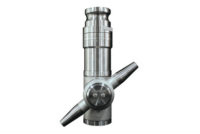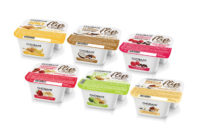Service Is Key in Filtration Separation

The plant manager called GEA Filtration, and the company's membrane filtration service personnel visited the plant, evaluated the situation and found a problem with the process design. They recommended changes, helped implement them, and trained the operators to run the system, bringing the WPC product up to the 80% spec.
This is one example of how lost profits can result from improper design, incorrect operation, and lack of knowledgeable service for membrane separation systems. But even under ordinary operating conditions, consistent service can help maintain peak efficiency and maximize profits.
Every dairy plant is unique, producing custom products from complex organic streams. Although all dairies process milk, milk streams differ depending on various conditions. The dairy pool produces a very wide spectrum of products. Cross-flow membrane filtration processes have become commonly accepted as the best technology for many sensitive dairy separations. It is a cost-effective means of producing very specific separations at low or ambient temperatures with no phase change. There are several basic technologies in widespread use:
Reverse osmosis is an energy-efficient de-watering process often used to pre-concentrate dairy or food streams prior to evaporation.
Nanofiltration can achieve very specific separations of low-molecular-weight components, used for recovery of hydrolyzed proteins, concentration of sugars, and de-ashing of dairy products.
Ultrafiltration is used to concentrate and purify medium-to-high-molecular-weight components such as dairy proteins, carbohydrates, and enzymes.
Diafiltration is often coupled with ultrafiltration for additional product recovery, using water injection to remove solubles and wash out low molecular weight materials.
Microfiltration removes bacteria and spores from milk, separates suspended particles, and fractionates milk proteins, as well as recovering cleaning chemicals.
Separation membranes are made from various materials, with the most common and most cost-effective for typical dairy applications being polymeric. Polymeric membranes are available in spiral wound for high-volume applications with minimal or no suspended solids. Tubular configurations are resistant to plugging, so are typically used where there are suspended solids or fibrous compounds. Hollow fiber polymeric membranes have an extremely high packing density and open channel design ideal for low solids liquid streams where backwashing from the permeate side is desired. For strength and resistance to extreme conditions of pH, temperature or solvents, inorganic membranes of ceramic or stainless steel are the material of choice. Ceramic membranes are often used in microfiltration for bacteria and spore removal.
Other applications of membrane separation in the dairy industry include:
- Protein standardization of milk prior to cheese production to increase yield.
- Concentration and demineralization of whey to reduce energy costs.
- Reduction of BOD/COD loading from evaporator condensate and permeate streams to reduce the cost of wastewater treatment.
- Salt brine cleanup.
- Clean-in-place (CIP) caustic and/or acid clarification and re-use.

The cleaning dilemma
Typical CIP systems require three factors for proper cleaning: turbulent flow, chemical concentration, and high temperatures. Most polymeric spiral membrane elements are temperature limited to 50ºC (122ºF). There are also pH limitations because the membrane material is most often cast onto polyester backing. It is very easily hydrolyzed at high and low pH, so concentrated chemical cleaning is undesirable. And membranes are somewhat limited by structural integrity as to how much velocity and turbulence they will accept. So all three of the factors required for proper cleaning are limited.Over the past ten years great advances have been made to improve the ease of cleaning and allow gentler, yet effective, cleaning. This has allowed more widespread use of membranes for separations and eliminated some of the problems associated with inappropriate cleaning. In order to clean properly, mild caustic is required, with enzymes to help break down fouling molecules and chelators to hold the broken-down products in solution.
In general, membrane separation systems have a low initial investment, but higher operating costs due to high cleaning cost. Procedures must be set for cleaning and followed strictly, with little room for deviations. Service is crucial to ensure dairy operators are running the plant properly and cleaning it adequately.
Certain types of membranes can be cleaned with chlorine, but many will not tolerate it. Ten years ago, membrane service companies would get a couple calls per year because chlorine was put into the system by mistake and had destroyed the polymeric membranes. Dairy operations are more sophisticated now, with segregated systems, so chlorine cannot come into contact with polymeric membranes.

The essentials
There are a number of things a dairy processor should expect in the way of service from a filtration membrane supplier. These can be broken down into four categories: training; oversight/ optimization; replacement membranes; and process testing/development/design.Training: When a membrane filtration process is first introduced into a plant, the operators usually know little about the process parameters and operation. The initial service requirement from the filtration service company is proper training for both supervisors and plant operators. Consistent operations are essential for reliable performance of membrane systems. A good service company is like a second set of eyes. Regular follow-up visits by the service technician will reinforce the training and correct any bad habits the operators may have developed.
Typically, when dairy management decides to implement a membrane filtration process, the membrane provider will design the system and either install it for the dairy or supervise in-house installation. As a part of assisting in the startup, the service company will train the operators for most efficient operation. Once the system is up and running, the membrane supplier's technical representative should stop in after one to three months to check on the process. Often the service technician will find that the operators have forgotten some vital point of their training or developed a bad habit that adversely impacts the separation. Even with processes that have been in place for years, periodic visits by the service company will ensure proper operation.
Oversight & Optimization: Proper operation of a dairy separation process will prolong membrane life. Membranes wear out gradually with constant use, and at some point the end product is not of sufficient quality. For example, in concentration of dairy proteins, the protein is perhaps 99.5% retained the first day. After a week or two it drops to 99.4%, and so on until the membrane must be replaced. The point of replacement depends upon the value of the protein. The decision to replace the membranes depends on the particular dairy's procedures, the value of the products, effluent standards, and possibly other factors, as well.
"We work jointly with GEA Filtration to decide when it's time to replace membranes," says Rick Kaepernick, v.p. of operations for Hilmar Cheese Co., Hilmar, Calif. "It's definitely a team effort."
Often dairy management makes the decision to replace the membranes, but sometimes managers will attempt to delay the expense of replacement without considering the consequences of the loss of valuable product. A good membrane service company will assist the dairy in making the economic analysis and balancing the lost profit versus the membrane cost. This is an invaluable benefit to the dairy looking to maximize profit.
Replacement Membranes: As noted above, organic membranes used for separation have a limited life span and need to be replaced periodically, usually about once or twice a year depending on processing rates and conditions. The more experienced the service technicians are with a particular dairy, the better able they are to know the replacement history and predict when new membranes will be needed. A good service company will stock sufficient membranes so that they are available when needed.
In the case of catastrophic failure of the membrane, e.g., if a polymer membrane is improperly cleaned or subjected to extreme conditions, quick supply is critical to keep plants operating. "Speed of replacement service is very important to us," says Larry Wintle of Agri-Mark/Cabot's cheese plant in Middlebury, Vt. "Sometimes there's no indication the membrane is going bad. They just let go all of a sudden. When that happens, we need our membrane supplier to get them to us very quickly."
A service company may stock replacement membranes at a central storage location, have consignment stocks with the manufacturers, and even keep replacement membranes at strategic customers' sites, just for that eventuality.
Process Testing, Development & Design: Top membrane suppliers often work with clients beginning in the process development phase. A dairy or other food processor might wish to isolate a particular compound from a process stream because of valuable functional properties. Pilot testing will determine how best to isolate the particular component. A few membrane suppliers have process engineering expertise, supplemented by applications centers and pilot plant facilities to help customers learn as much as possible about the compounds involved. A rental pilot plant can be delivered directly to the customer's site to establish separation data. The usual procedure is to begin with a small pilot unit to screen various membranes for feasibility, and once the best type of membrane is determined, further testing on a unit specific to the membrane type will refine process parameters.
Where the customer is looking at an established process with no testing required, the supplier's process engineers can design a plant and generate a proposal based on capacity and product quality.

Models for optimum operation
There are as many service programs as there are membrane companies, but the best service comes from suppliers with process expertise. Unlike the membrane manufacturing companies, who understand materials science and production techniques, but not process applications, a membrane filtration company should have a broad spectrum of process design capabilities.Service options are best described by looking at a particular example. GEA Filtration, a leader in cross-flow membrane filtration, has established a membrane service program with three levels of service designed to meet the needs of any user. The three levels of service are the Membrane Replacement Plan, the Membrane Service Agreement, and the Membrane Maintenance Program.
Membrane Replacement Plan is quite simply the supply of membranes that enhance process performance at a competitive price. A large membrane stock and a very quick replacement time are key components. Such a program should come from a company that has relationships with all major membrane manufacturers. The program includes occasional visits by service technicians. GEA Filtration's plan is available to any dairy, even those who originally bought from another supplier.
Membrane Service Agreement is a middle level of service. Service technicians and engineers assist the client by performing process audits and making recommendations for the best performance of all filtration systems in the plant. The client receives all the benefits of the Membrane Replacement Plan, with the addition of having regular service visits that help optimize operations and keep processes running at peak efficiency. The client also has access to design and process engineering expertise for any needs that arise.
Membrane Maintenance Program is the top level of service. A client signs a contract for a period of time, usually three years, and pays a monthly fee for process monitoring and all the membranes required. A dedicated service technician makes sure that all the membranes and process systems are in tiptop shape and operating appropriately. Constant observation through personal visits and reporting of data gives the service technician the information needed to optimize replacement time, and at that point replacement membranes are provided. If there is any type of problem, a call to the service technician should bring instant help.
Hilmar's Kaepernick utilizes a Membrane Maintenance Program for the company and says it has been very successful.
The Membrane Maintenance Program has a number of major advantages for the customer. The service company assumes the responsibility for membrane performance, and all membranes are kept operating at optimum levels for maximum profit. The risk of membrane failure is shifted to the service company. The customer has a fixed budget. And the service program is customized for each individual client.
Engineering, design, fabrication, and installation of membrane filtration systems are all very important. But the day-to-day operation, maintenance and servicing of a system are the keys to maintaining profit levels for dairy owners. n
GEA Filtration dedicated skilled technicians are able to offer many levels of customized service. The service technicians are supported by a large process engineering department at GEA Filtration headquarters in Hudson, Wis. For more information visit www.geafiltration.com or call 715/386-9371.
Looking for a reprint of this article?
From high-res PDFs to custom plaques, order your copy today!






